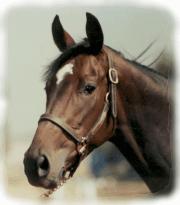A Horse, of Course with Don Blazer |
If you enjoy learning about horses, then you'll love our online courses. Each month you'll find a new column on our web site. We hope you'll enjoy it, and maybe e-mail us with questions or suggestions for other columns. A Horse, Of Course is a monthly column syndicated by Success Is Easy. If you like the column, call your local newspaper, or local horse publication and ask them to subscribe by contacting Success Is Easy. |
The Horse Business Cycle Don Blazer copyright©2011 |

I'm the kind of guy who sees the world through rose-colored
glasses. I view the glass as half full rather than half empty. I like to turn negatives into positives. I'm also pretty good at seeing what is what. I know it's been a lean year financially if you own a horse business! Expenses are up, income is down. It's been a costly year if you just own a horse. The cost of hay is up, the cost of boarding is up, the cost of veterinary care is up, the cost of shoeing is up, the cost of tack is up….heck, everything is up, and you can bet it isn't coming down. It's expensive to show horses. The cost of travel has skyrocketed, not to mention entry fees, ground fees and stall fees. And because the number of entries has gone down, the cost of classes has been hiked and competitors get hit with "double drug fees" just because the show is double judged. (Now where is that extra 'drug fee' money going?) So where is the good in all this gloom? Actually, everywhere! Hanging onto cash, a whole lot of mare owners didn't breed their mares the last few years. And those who did, bred only good mares to popular stallions. The result; foal crops are down, but there are more quality horses. And that's good. When economic times were good, and people where spending what they didn't have, horse owners were breeding everything and anything that could carry a foal. The result: lot of young horses without much value. While the market was glutted with mediocre horses, no one stop breeding and the price of horses went down. And that's bad. The economy tanked in 2008 and suddenly we had all the horror stories of people abandoning horses, starving horses and people giving horses away because they couldn't afford them. To add to the misery, the US slaughter plants were closed and unwanted horses had to be shipped to Mexico or Canada, which made them worth even less. (This problem will be rectified as new US slaughter plants are opened.) Well, things are looking up. I just returned from a major horse sale. The quality of horses in the sale was up. The price of yearlings was up. The price of well-bred horses with lots of performance potential was up. Broodmares without performance records were selling cheap---as they should. Horses that were tried on show circuits but couldn't reach the higher levels were selling at reasonable prices. Any buyer who complained about the high cost of the horses simply doesn't understand the expenses involved or is too "cheap" to be in the horse business. Well-bred horses with performance potential are worth the cost. Any seller who complained about what he or she received for a horse needs to look first at "potential of the horse", and then at why the market didn't want it. The world changes…the horse industry changes…whether we like it or not, good horses are going to get more expensive and cheap horses are going to get cheaper. In the early 1900s the horse population was up to nearly 22 million (primarily work horses). By the 1950s the population had dwindled significantly. In the 1960s "work horses" were nearly forgotten and "recreation horses" were the big rage. The horse population was growing again. During the 1970s, 80s and 90s, the number of horses was on the increase; unfortunately the number of poor quality horses was growing faster than the number of quality horses. The industry was booming. Then the millennium rolled around the bust came with it. It's the nature of all things to cycle. We are just starting a new cycle---things are different within the industry, but you can ride the change and it will be good. Just be smart enough to change horses when the cycle begins down again. It's your perception, approach and action which makes the difference. |